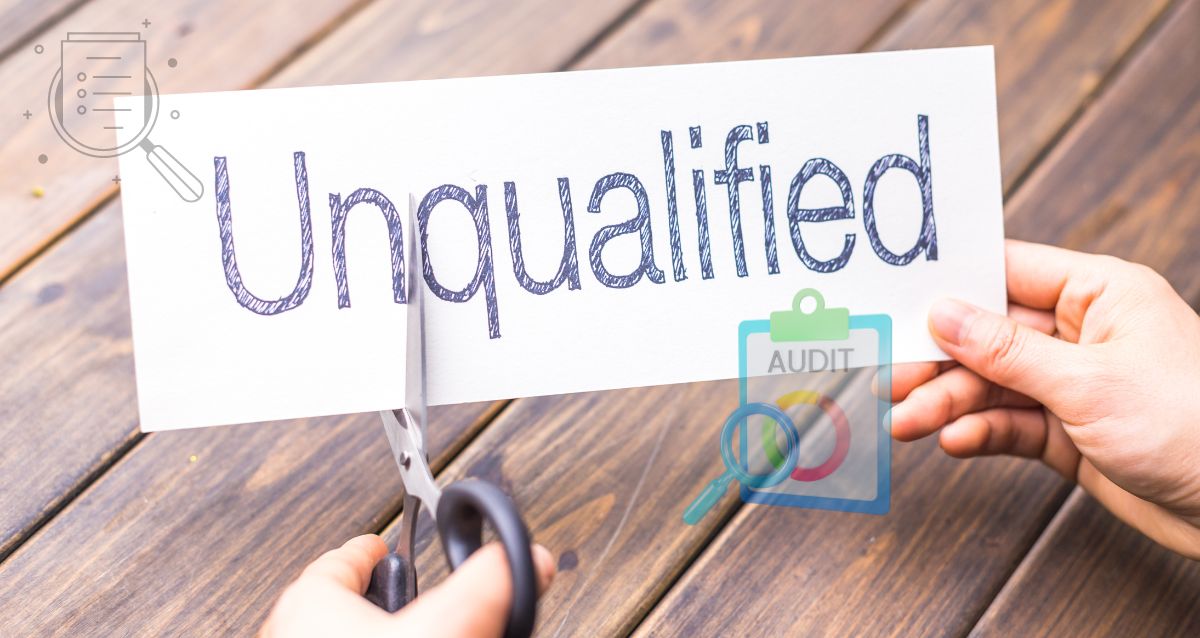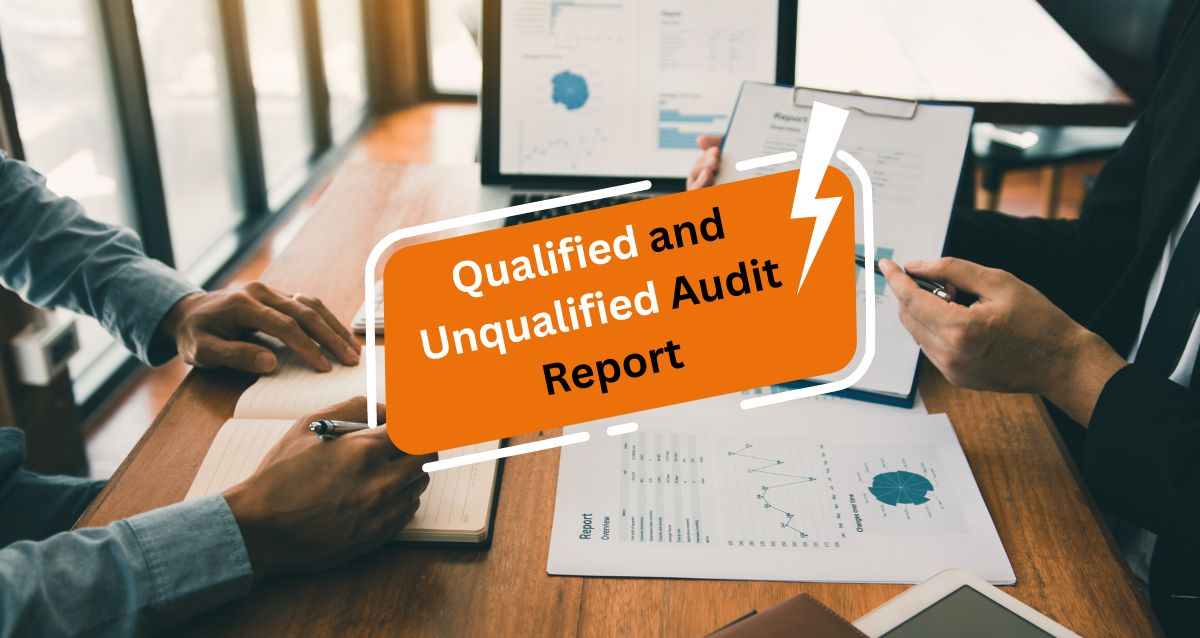Qualified and Unqualified Audit Reports
Audit reports have a critical role in maintaining the integrity of financial reporting. An objective & independent assessment of an entity’s internal controls, financial statements & laws and regulations compliance is provided to the stakeholders of the entity. They also help the entity's management identify areas that need improvement and implement corrective actions. Investors & creditors are assured of the reliability and accuracy of the financial statements. They come in different types, and each report has a different message.
Types of Audit Reports
Audit reports are the end products of the auditing process and they contain the opinion of the auditors on the company’s financial statements. The main purpose of audit reports is to have an independent, unbiased opinion on the financial statements of the entity. After conducting an audit, the auditor can issue one of the four types of reports to express his opinion based on the audit conducted – these include unqualified reports, qualified reports, adverse reports and disclaimer reports. This article focuses on the qualified and unqualified reports in detail.
Unqualified Audit Reports
An unqualified report is the most desirable report for any entity as this report indicates that the financial statements are free from material misstatements and comply with the regulations and standards (IFRS/GAAP). This type of report is also known as a ‘clean report’ and it provides the stakeholders with assurance that the financial statements are accurate and reliable. This information is crucial for the stakeholders to make decisions about the entity’s financial health.

When is an Unqualified Audit Report Issued?
If the auditor, after verifying the books of accounts comes to a conclusion that the books of accounts have been appropriately maintained, there are no mistakes, inadequacies and frauds, the profit or loss as shown by the Statement of Comprehensive Income and the financial position as shown by the Balance Sheet are correct which means that the auditors have no complaints and suspicions, then in such a situation, the report issued by the auditor is called an unqualified audit reports.
How an Unqualified Report can help the Stakeholders?
An unqualified audit opinion helps to build trust and credibility with stakeholders which leads to increased investment and improved business relationships.
➦ Creditors
An unqualified report assures the Creditors that the Company is going fine and has the ability to repay their dues as and when they fall due. It helps them to assess the creditworthiness of the entity, which will help them decide whether to extend credit facilities or not.
➦ Investors
An unqualified report helps investors evaluate the financial health of the entity they are investing in or plan to invest in. This helps them make informed decisions about their investment which is crucial for their financial wellbeing.
➦ Regulators
An unqualified report helps regulators as it signifies that the entity is complying with the rules and regulations which are relevant to the entity. This helps them make informed decisions about the compliance of the entity with regulatory requirements.
➦ Management
It helps the management of the entity to evaluate the effectiveness of internal controls and the financial reporting processes of the entity.
Qualified Audit Reports
A qualified audit report indicates the auditor’s inability to give a “clean report” and does not mean that the entity is suffering or the financial statements of the entity are not transparent. It indicates that there are a few issues in the financial statements.
If during an audit the auditor finds discrepancies, irregularities, frauds or other deficiencies in the books of accounts, i.e. the auditor is not fully satisfied with the accuracy of the Statement of Comprehensive Income and Balance Sheet of the entity, then the auditor expresses the various points which makes the accounts of the organization inaccurate in his report. An auditor mentioning these issues in his report is a qualification in itself.
A report which has such a qualification is known as a “Qualified Report”. A qualified audit report does not certify the truth and the correctness of the accounts of the entity.

When is a Qualified Audit Report Issued?
A qualified audit report is issued when there is either a disagreement between the management of the entity and the auditor on the scope of the auditor’s work or the 3A’s of accounting policies (adequacy, application or acceptability).
In order to consider the qualification of an audit report, an issue must be material, not pervasive. In case the issues are both material and pervasive an adverse or a disclaimer of an opinion is provided by the auditor.
It is essential for an auditor to issue a qualified audit report in the following cases:
- When the entity does not maintain the necessary books of accounts as per the Companies Act.
- When adequate information is not received by the auditor from the ‘branches’ audited by him.
- When the directors or other officials refuse to give important information and clarifications to the auditor.
- When the entity has branches the audit for the branches is done by other auditors and these reports are not received by the auditor.
- When the statement of comprehensive income and the balance sheet of the entity does not disclose information as required by the Companies Act.
- When the Statement of comprehensive income and the balance sheet are not as per the accounts of the entity.
- When the financial statements of the entity do not show a true and fair view of the financial position and the profit or loss.
- When insufficient provisions are made by the entity for depreciation, bad debts and contingent liabilities.
- When the entity has not followed the accounting principles on a consistent basis.
- When the fair valuation of the assets is not done or a significant change is made in the valuation method by the entity.
- When the entity defaults in following the provisions of the Companies Act – such as giving remuneration to the Directors against the provision of the Act.
- When the generally accepted level of auditing is not met on examination of the books of accounts of the entity.
- When secret reserves are created by the entity.
Impact of Qualified Reports on Stakeholders
Stakeholders of an entity such as their creditors, banks, investors, regulators, etc. view a qualified opinion as unfavorable. This would lead to issues for the entity in future. This is explained below.
➦ Investors
In case the auditor has issued a qualified audit report to an entity, the investors would think twice before investing their funds into the entity as they would be unable to evaluate the financial health and wellbeing of the entity as a qualified report does not certify the truth and correctness of the entity’s accounts. The company is viewed as risky by the Investors and Lenders and they may be hesitant to invest or lend money.
➦ Banks
Banks require audit reports in order to make a decision to provide or extend credit facilities to an entity. In case the auditor has issued a qualified report, the bank would require additional details based on the reason for qualification in order to take a decision on providing or extending credit facilities to the entity.
➦ Creditors
Creditors may not be able to assess the creditworthiness of an entity if a qualified report is issued by the auditor. This may impact future trade relations as the creditors may not be willing to provide credit facilities or extend the credit facilities to the entity.
Impact of Qualified Reports on the Entity
Qualified audit reports can have an impact on the entity as well. The reputation of the entity may be affected due to weaknesses in the financial reporting process of the entity. This may lead to reduced share prices of the entity and lower the credit rating of the entity.
Apart from the above, the qualification by the auditor may require the entity to take corrective action on the issues identified by the auditor. This would include restatement of the financial statements or improving the internal controls of the entity or revising the entity’s accounting policies and procedures.
Differences in the Audit Opinion Paragraph for Qualified and Unqualified Reports
The wording of the audit opinion is different when a qualified and an unqualified opinion is provided by the auditor. These differences are elaborated below:
An unqualified opinion by the auditor would state that the financial statements are true and fair as at the year-end and they are presented fairly in all aspects. Apart from this is would also mention that the financial statements are prepared in accordance with the International Financial Reporting Standards.
However, in case of a qualified opinion, the opinion paragraph would state that the financial statements are true and fair as at the year-end and they are presented fairly in all aspects except for the adjustments (if any) and areas where the auditor was unable to perform tests. It would clearly state the reasons as to why the auditor has issued a qualified report and would mention that apart from the adjustments and areas where the auditor was unable to perform the tests everything else is presented fairly as per the International Financial Reporting Standards.
Avoiding Qualified Audit Reports
In order to avoid a qualified audit, reports an entity should implement the following:
- Strong internal controls are reviewed on a frequent basis to check for their effectiveness.
- Maintain accurate and complete financial records to ensure no issues are identified by the auditor which may lead to the auditor providing a qualified report.
- Frequently reviewing the accounting standards and policies to ensure they remain updated on the changes in the accounting standards so that the accounts and financial statements are prepared with the updated standards and policies.
- Discuss and understand the issues with the auditors and develop a plan to address the issues to ensure these are not repeated in future.
To learn more about What is Qualified and Unqualified Audit Reports?, book a free consultation with one of the Flyingcolour team advisors.
Disclaimer: The information provided in this blog is based on our understanding of current tax laws and regulations. It is intended for general informational purposes only and does not constitute professional tax advice, consultation, or representation. The author and publisher are not responsible for any errors or omissions, or for any actions taken based on the information contained in this blog.
